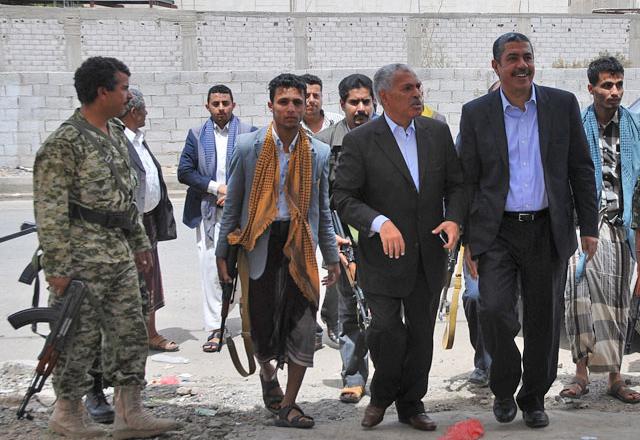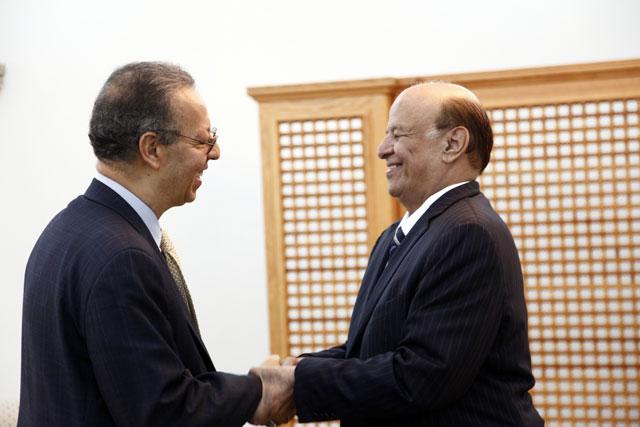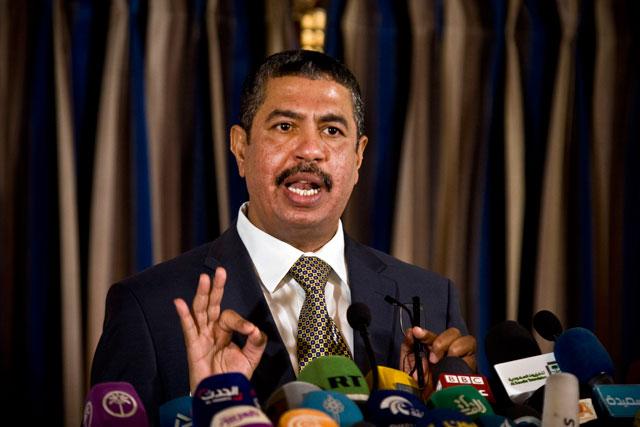You are here
Yemen talks to resume as militia’s ‘coup’ denounced
By AFP - Feb 09,2015 - Last updated at Feb 09,2015
SANAA — The United Nations said all parties in Yemen have agreed to resume talks on Monday, three days after a Shiite militia took power in a move widely condemned as a "coup".
Factions including the Houthi militia accused of seizing power would take part in the talks, envoy Jamal Benomar said Sunday as the UN chief called for Western-backed President Abed Rabbo Mansour Hadi to be restored to power.
On Friday, the militia dissolved parliament and created a "presidential council" in a move it said was designed to fill a power vacuum after Hadi and Prime Minister Khalid Bahah resigned last month.
The militia also sought to portray the move as a way of heading off the threat from Al Qaeda, which has a strong presence in east and south Yemen.
Benomar told reporters in Sanaa that Shiite militia leader "Abdelmalek Al Houthi and all political parties in Yemen have agreed to resume dialogue... which will begin tomorrow [Monday]".
The UN envoy insisted that all political leaders "take up their responsibilities and achieve consensus" in order to reach a "peaceful solution" to the crisis.
Tensions remained high in the south and southeast, where authorities said they did "not recognise" the rule of the Houthis and that they "totally reject the constitutional declaration" under which they seized control.
Speaking to reporters after talks with King Salman in Sunni powerhouse Saudi Arabia, UN Secretary General Ban Ki-moon warned "the situation is very, very seriously deteriorating, with the Houthis taking power and making this government vacuum".
"There must be restoration of legitimacy of President Hadi," Ban said.
Fears of chaos
The fall of Hadi's government has sparked fears that impoverished Yemen — strategically located next to oil-rich Saudi Arabia and on the key shipping route from the Suez Canal to the Gulf — would plunge into chaos.
Yemen's Gulf neighbours, led by Saudi Arabia, on Saturday voiced alarm and condemned what they called a "coup" in Sanaa.
A US official at a security conference in Munich said Washington and its Gulf Arab allies "don't agree" with the Houthis' plans for a transition.
Arab League chief Nabil Al Arabi on Sunday echoed that statement, branding the Houthi move as a "coup against constitutional legitimacy to impose that group's will at gunpoint".
Hadi had been under virtual house arrest since the Houthis seized the presidential palace and key government buildings last month, prompting him to tender his resignation to parliament, along with Bahah.
The Houthis have said they will set up a national council of 551 members to replace the legislature in the violence-wracked country.
Yemen is a key American ally in the fight against Al Qaeda in the Arabian Peninsula, which claimed responsibility for last month’s deadly attack on French satirical weekly Charlie Hebdo.
Abdelmalek Al Houthi said creating the transitional bodies, which include a security committee, would also head off the threat from Al Qaeda.
Heavily armed tribes
However, the statement by authorities in the south, which was independent until 1990, said forces in these provinces — Aden, Abyan, Lahj, Shabwa, Daleh and Hadramawt — rejected the Houthi takeover.
In the oil-rich eastern province of Marib, which the Houthis have long been eyeing, deputy governor Abdelwahid Namran told AFP that Sunni tribesmen were “discussing means of facing any developments”.
Marib residents said heavily armed tribes were preparing to counter any attempts by the Houthis to take over their region.
“The Houthis are incapable of governing [Sunni-majority] Yemen alone,” said analyst Ali Al Bakaly.
Any attempts to expand beyond Sanaa and nearby cities “under the cover of the constitutional declaration... will provoke a civil war” in the deeply tribal country awash with weapons.
The Houthis, also known as Ansarullah, have been met by deadly resistance from Al Qaeda and Sunni tribes since they descended from their northern strongholds and expanded south of Sanaa last year.
Ban said his envoy Benomar had been “working very hard in Yemen, facilitating a way out of the current political crisis and a return to the path of the peaceful political transition”.
UN Security Council President Liu Jieyi said on Friday its 15 members were ready to “take further steps” if UN-brokered negotiations to resolve Yemen’s political crisis were not resumed “immediately”.
Related Articles
Yemeni Prime Minister Khalid Bahah said that he was poised to leave the capital Sanaa on Monday after Shiite militia agreed to free him from two months of house arrest.
Yemen's President Abed Rabbo Mansour Hadi met Thursday with the UN envoy in Aden, as the southern city increasingly became the country's de facto political and diplomatic capital instead of militia-held Sanaa.
Yemen's new Cabinet was sworn in on Sunday despite calls by former autocratic president Ali Abdullah Saleh and Shiite militias allied to him for it to be boycotted.














